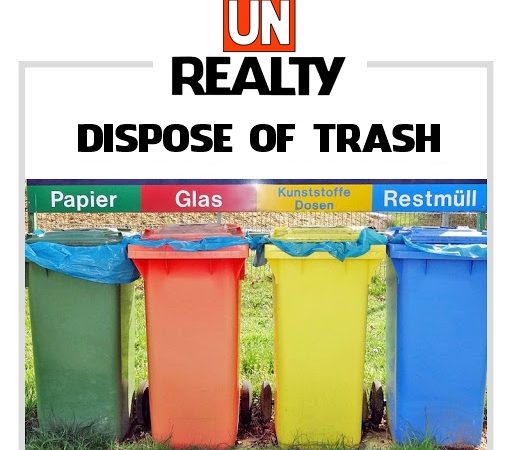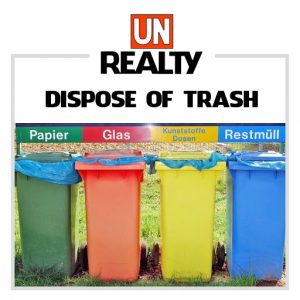
Korea has different rule about disposal and recycling of trash
Korea uses a system called jongnyangje for the effective collection of garbage wastes and the reuse of natural resources. All garbage you produce must be disposed of properly, and you may be fined otherwise. Garbage must be separated according to whether it is “common garbage” (ilban sseuregi), food waste (eumsikmul sseuregi), recyclable (jaehwal yongpum), and large waste objects (daehyeong pyegimul). While some of the information below applies specifically to the Seoul Metropolitan Area, the same type of policies exist throughout the country.
Food Waste must be separated from general waste and placed in special disposal bags that can be purchased at your local supermarket and in some convenience stores in your neighborhood. Each district has its own specific bags. The regular ones are called Sseulaegi Bongtu (쓰레기 봉투 ) while the food disposal bags are called Eum-shik-mool Sseulaegi Bongtu (음식물 쓰레기 봉투 ). Costs vary from one district to the other. Waste food disposal bags come in three sizes: 3 – 5 – 10 liter bags.Not all food waste can be put in the food disposal bags – the suggested rule of thumb is to include only what animals can eat as food waste.
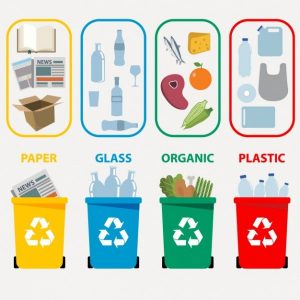
★★★The following items are not acceptable as food waste :
■Fruits : seeds of peaches, apricots, persimmons, etc. as well as hard shells such as those of acorns, chestnuts, peanuts, walnuts, coconuts, pineapples, etc.
■Meats: bones and feathers.
■Fish/Seafood: shells of clams, abalone, sea squirt, crabs, lobsters, etc.
■Others: tea bags, herb medicine residues, etc.
Recycling is mandatory and recycled items can be disposed of in any clear plastic bag or divided by items and bound – please rinse or wash before disposing of containers. As with general waste, recyclable waste should be placed outside the building or in designated areas. Check with your realtor or local district office for days/times.
★★★Recyclable Items
■Paper: newspapers, books, notebooks, wrapping paper, corrugated card board, paper bags, paper boxes, milk cartons
■Glass: beer, liquor and soda bottles
■Metals: beverage cans, spray cans, iron tools, butane gas bottles, iron wires, aluminum, stainless steel
■Clothes: cotton clothing
■Styrofoam: chock-absorbing materials for electronic products, boxes for electronic products, boxes for fruit and fish, clean instant noodle containers, etc.
■PET Bottles: containers with the number ‘1’
■Plastic: items with the numbers ‘2’, ‘4’ or ‘5’ written on the container
■Film: candy wrappers with recycling symbols, instant noodle wrapping, instant coffee packaging
■Milk Packs: milk containers
■Fluorescent Lamps: light bulbs, non- broken lamps
■Plastic bags: any plastic bag
■Batteries: mercury/mercury oxide batteries such as those found in watches, etc. Also, nickel/cadmium batteries (rechargeable).
NOTE: In order to encourage the proper recycling of items that include metal parts which can be reused, the Yongsan District Office (and some others- check with your real estate agent) allows residents to place the following items out for pick up at no charge: computer, monitor, keyboard, printer, laptop, modem, game device, scanner, fax machine, clock, audio equipment, water cooler, gas range/oven (less than 1m across), humidifier, clothes iron, electric fan, vacuum, VCR/DVD player, telephone, electric heater, rice cooker, toaster, mixer, radio, and other such small electronic devices. To dispose of these kinds of items simply place them out on the same day as you do other recyclables.
* Please note that cell phones are not included in the list. These can be disposed of separately at your local community center
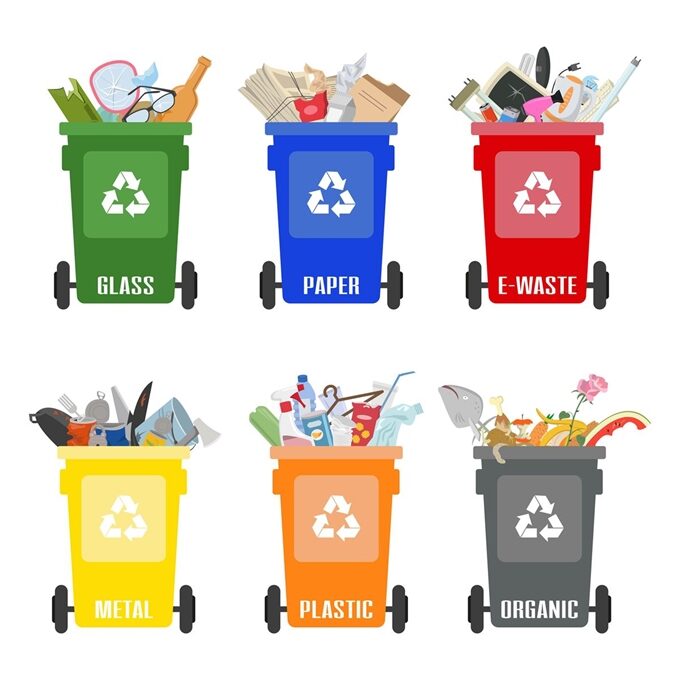
★★★Non-recyclable Items
■Paper: plastic-coated paper bags, plastic-coated paper cups
■Glass: sheet glass, mirrors, heat-resistant dishes, milky white bottles, cosmetic bottles, china dishes
■Metals: paint and oil containers, any toxic material container
■Clothes: bedding, pillows, bags
■Plastic: items with either ‘3’ or ‘7’ marked on the container, writing instruments, buttons, sockets, electric heaters, toys, baby walkers, phones, items coated with PP or PE
■Milk Packs: foil tops, container labels
■Fluorescent Lamps: broken lamps or bulbs
■Plastic bags: instant noodle wrappers, contaminated plastic bags
■Batteries: mercury batteries are designated “NR MR”, mercury oxide batteries are designated “SR”.
★★★Disposing of large items such as furniture, electronic products, office items, heating/cooling products, etc. that cannot be put in standard size bags. There is a fee for disposing of these items that varies from ₩2,000 (chairs, 4-drawer dressers, vacuum cleaners) etc. to ₩8,000 for large items (refrigerators, air conditioners) to
₩15,000 for very large items (piano). Talk to your property owner or manager, real estate or relocation agent for the contact details of your local dong office – sometimes someone will have to go to the dong office, pay the fee and pick up the sticker that must be placed on the item before it will be picked up.
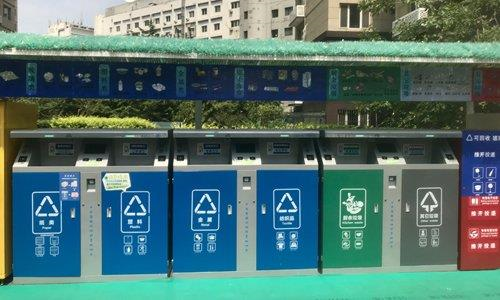
Most large apartment complexes will have marked boxes into which you must place your recyclables.
In 2007, houses and small apartments/villas were issued with net bags for their recyclables. Some still have them, but many have disappeared into the garbage trucks or simply been taken. If you don’t have the nets, you are expected to put the recyclables into a bag or box and place them outside your house or in the designated area of your building on the even of the recycling pick-up day.
Garbage Disposal Hours vary from one municipality (-si or -ri) to the other. Non-compliance can result in a fine of up to W300,000. Scroll down this page and click on Garbage Disposal Hours – Seoul for information on the hours in some of the ‘gu’.


